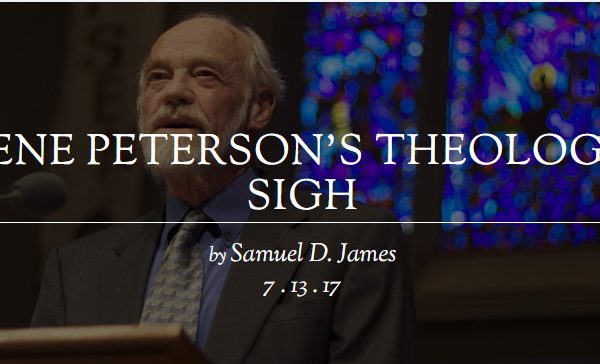

(By Samuel D. James, First Things). This week, Eugene Peterson became arguably the most consequential evangelical to endorse same-sex relationships and marriage. His short interview with Jonathan Merritt isn’t always clear; there is some hedging and “as far as I’m concerned” moral equivalency. But his testimony leaves little doubt, especially since it feels so very familiar. Peterson’s sexual ethic is overwhelmingly anecdotal. His story of embracing same-sex relationships through friendships and pastoral relationships is a reminder of just how natural, intuitive, and authentic heterodoxy can feel in a post-Christian culture.
As one who holds to historic Christian teaching on sex and marriage, I believe that Peterson is very wrong on homosexuality. But I’m gradually coming to understand what a daily burden holding fast on this doctrine can be, particularly for Christians whose gifts and temperaments place them “out there,” in the nexus of city and culture. That’s what I hear in Peterson’s interview: a theological sigh, an admission that the existential toll of living and serving among those to whom he would have to preach repentance is simply too much.
Says Peterson, “I wouldn’t have said this twenty years ago, but now I know a lot of people who are gay and lesbian and they seem to have as good a spiritual life as I do. I think that kind of debate about lesbians and gays might be over.” Why is the “debate” over? Because the LGBT people Peterson knows are good, spiritual people. How can that knowledge—not the knowledge of doctrine, but the knowledge of human beings—comport with an antiquated definition of chastity and marriage? What use are theological disputations when it comes to looking real gays and lesbians in the face, living with and loving them, and affirming their humanity and worth?
The question for our generation is increasingly not, “Is this doctrine true or false?” Rather, the question is, “Can I live with it out there?”
Related articles:
LifeWay Prepared to Stop Selling The Message Over Eugene Peterson’s LGBT Comments, Christianity Today
Should We Still Read Eugene Peterson?, by Russell Moore
Message Bible Author Eugene Peterson: Homosexuality Not Wrong, Megachurches Aren’t Real Churches, The Christian Post
A Response to Eugene Peterson’s Affirmation of Homosexuality, By Owen Strachan, Patheos
Eugene Peterson on Changing His Mind About Same-Sex Issues and Marriage, By Jonathan Merritt, Religion News Service
The Bible and Same-Sex Relationships: A Review Article, by Tim Keller, The Gospel Coalition, By Jonathan Merritt, Religion News Service
1 Comment. Leave new
If you read his rather “breezy” interview it is much like my old great uncle who had finally given up from chasing kids from his front yard, or came to peace with all the squires at his bird feeder. A quiet resignation. And I suppose in retirement and latter years one does tend to wax philosophic. And yes, in his own words of course people will leave, flee, find other churches in response to the coup of the LGBTQ lobby in all things PCUSA. But here is what never crosses his mind. Those who did, do, or in future leave the PCUSA will indeed find other churches or houses of worship more agreeable to them theologically. And they will thrive and be blessed.
But those who remain in the PCUSA are by politics and ideology, or those whom the new PCUSA “brand” appeals too are best described as cultural secularists, urban agnostics, pan-theist new-agers, and or other assorted folks who already are captured by the cultist practices of UU, nature, native worship behaviors or Quakers. Folks who would not even walk across the street to engage in anything PCUSA, unless its of a political nature, resistance, anti-Trump, pro environment, social work stuff. Hence the PCUSA is replacing church goers, faithful people with either nothingness, air, empty pews and churches or those with religious commitments and behaviors of the populations of Portland and most of Vermont.
Good luck with that PCUSA. You got and get exactly what you deserve and what you wanted all along. Enjoy the decline into nothingness.